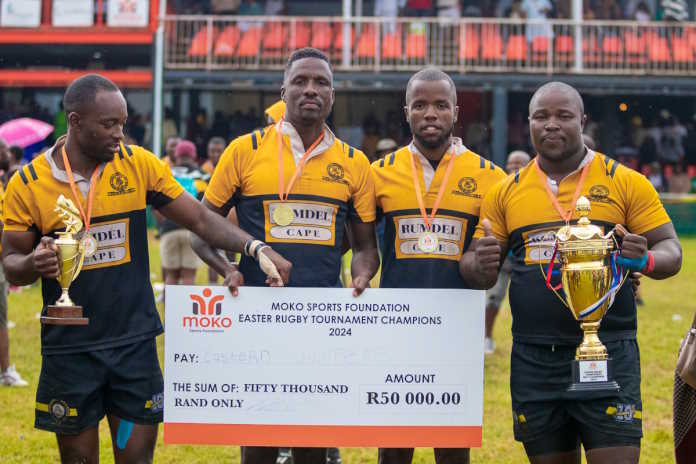eZihlahleni, Eastern Cape, – Eastern Cape rugby player Oyisa Balekile knows what it is to go without.
He cannot remember the number of times he arrived at the training ground on an empty stomach or had to walk long distances barefoot just so he could play a match.
Yet the 21-year-old from Mamata Location in Qonce (King William’s Town) would do it all again, such is his love for the game of rugby.
This passion has only intensified since winning the Moko Sports Foundation’s 3rd Annual Easter Tournament of Orange Fridays with his team, Eastern Jumpers.
The four-day event, staged in eZihlahleni outside Qonce over the Easter weekend, saw 32 teams from the rural Eastern and Western Cape vying for the title and a grand prize of R50 000.
The tournament is aimed at offering exposure to rural players who otherwise would not have the opportunity to catch the attention of scouts potentially able to advance their careers in the sport.
Despite growing up with very little in terms of material possessions, Balekile has never wanted for affection at home.
“I accepted my situation. With the support of my mom and dad, I have managed to conquer all obstacles. I’m from a family who believes in life values. I was taught to love and care for other people, knowing very well that it takes a village to raise a child,” Balekile, an alumnus of Lovedale College, says.
“That is why I’m fighting for my team, Eastern Jumpers. It’s because of my family and community. I encourage others to continue to work hard and the opportunities will be there. Focus more on the things that you can control and don’t stress much about those you can’t.”
Eastern Jumpers defeated Strongwave Rugby Club in the grand final of the festival, which also included cricket and horseracing events.
For Balekile’s teammates, Anganathi Kiswa, 23, and Themba Solimo, at 37 the elder statesman of the side, the victory proved that no matter what one’s background, glory could be achieved.
“Do not give up. Stay in the fight because your time will come,” says Solimo.
He, perhaps more than most, understands the importance of exposure for young rugby players.
Hailing from the small Eastern Cape town of Komga, it was extremely difficult to forge a path to the Border Super League. It was only thanks to the intervention of East London Police Rugby Club president and former player Bonga Mtunjani that he was able to get his shot at Border rugby’s big time.
It was a baptism of fire, as his sleeping quarters in those early days was the team’s clubhouse. Yet he has gone on to excel in the sport.
“Rugby has brought out discipline and character in me,” he says.
Kiswa, currently a second-year student at Walter Sisulu University (WSU), started playing rugby at Healdtown Comprehensive School near his hometown of Fort Beaufort.
A huge fan of former Springbok wing Bryan Habana, he hopes to become a professional player and represent his country at the highest level.
Like many of his Eastern Jumpers teammates, his upbringing was devoid of many of the trappings wealthier South Africans might take for granted.
Not having the necessary equipment was always a challenge, yet he refused to let this stand in his way.
“I overcame my challenges by passing all my grades in high school, telling myself that I wanted to play better rugby at university,” he says.
This attitude has enabled him to achieve his dream, and he is currently a member of WSU’s FNB Varsity Shield squad.
“I would like to advise young players to have a positive mindset and work hard. And they should always combine sport with education,” he says.
Moko Sports Foundation founder Siyabulela Moko says in rural areas, access to higher education and professional development opportunities relating to rugby may be scarce.
“Without adequate academic and career support, players may struggle to balance their athletic pursuits with their educational and professional aspirations, limiting their long-term prospects both on and off the field,” he notes.
“By addressing these challenges and implementing targeted interventions, we can empower aspiring rugby players from rural communities to overcome barriers and pursue their dreams in the sport with confidence and determination.”







